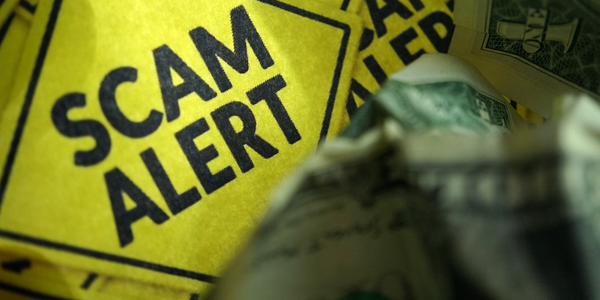
Scams are not new, but scammers are always finding new ways to take your money or identity (among other things).
AARP estimates there are about 80 scams going on in our community at any one time. Learn how to recognize a potential scam and educate yourself about some of the ones our local law enforcement have seen in our neighborhoods recently.
Credit Card Skimming
Fairfax County detectives from the Police Financial Crimes Unit recently uncovered a credit card skimming operation that targeted ATMs and payment devices inside stores across the Richmond Highway corridor. Credit card skimming devices are often small, discreet and designed to blend in seamlessly with legitimate card readers. They can be found at ATMs, gas pumps and even self-checkout machines.
Here are some tips to help protect yourself from becoming a victim:
- Inspect before you insert. Before using an ATM or gas pump, look closely at the card reader and keypad. If the card slot looks loose, bulky or mismatched in color or material compared to the rest of the machine, it could be a skimmer.
- Check for hidden cameras. Skimmers are often paired with tiny cameras aimed at capturing your PIN. Look for any unusual attachments, pinholes or objects positioned near the keypad.
- Do not accept assistance from anyone you don’t know while using an ATM or payment device. Scammers sometimes pose as helpful bystanders to distract you or capture your information.
- Cover your PIN. Always use your hand to shield the keypad while entering your PIN, even if you don’t see anything suspicious.
- Use familiar or well-lit locations. Whenever possible, use ATMs inside banks or high-traffic areas where criminals are less likely to install devices unnoticed.
- Monitor your accounts regularly. Review your bank and credit card statements frequently for unauthorized transactions, even small ones, which can signal a compromised card.
- Use contactless payment methods. Tap-to-pay cards or mobile wallets provide an extra layer of protection, as they don’t transmit your physical card data.
If you believe you’ve been a victim of skimming or notice a suspicious device, do not attempt to remove it. Instead, call the police non-emergency number at 703-691-2131.
Jury Duty Scams
Court officials issued a warning to residents about a surge in jury duty scams. Residents, both from Fairfax County and surrounding jurisdictions, have reported receiving phone calls, voicemails and emails claiming they have missed jury duty, specifically federal grand jury duty. These communications falsely indicate that citations or arrest warrants have been issued and threaten the recipients with arrest by deputy sheriffs if they do not respond immediately to fix the supposed issues or click the link to ‘reschedule’.
If you receive a similar warning about missed jury duty:
- Do Not Respond. Avoid providing personal information over the phone or via email. Do not click links or open attachments from unknown sources.
- Verify Communications. Contact the official Fairfax County court offices directly if you have doubts about your jury duty status. The Circuit Court’s Jury Department can be reached by calling 703-246-2292 or visiting www.fairfaxcounty.gov/circuit/Jury/general-information.
Fire Inspector Scam
The Office of the Fire Marshal has received multiple reports of scam attempts by fire inspector impersonators demanding payment in order to keep a business open. Inspectors will NEVER contact a residence or business and demand payment. When inspections require payment, it will ONLY be collected through the Planning and Land Use System (PLUS). Inspectors will always be in uniform and have Fire Marshal identification.
While Fairfax County codes apply to everyone, routine inspections do not take place in detached homes, townhomes, etc. If you have a question about the validity of an inspection or fee, contact the Office of the Fire Marshal at 703-246-4803. If you believe you have been scammed, contact your local police department and report it online.
Silver Shield Anti-Scam Program
 The Silver Shield Anti-Scam Program is an initiative designed to protect older adults, people with disabilities and family caregivers from scams and fraud. Through presentations and resources, the program raises awareness about common scams—such as imposter schemes and financial fraud—and teaches strategies to avoid becoming a victim. The annual "Scam Jam," held in partnership with AARP Virginia, brings together experts in law enforcement, finance and consumer protection to provide the latest information on how to avoid falling for a scam and other resources to keep older adults safe.
The Silver Shield Anti-Scam Program is an initiative designed to protect older adults, people with disabilities and family caregivers from scams and fraud. Through presentations and resources, the program raises awareness about common scams—such as imposter schemes and financial fraud—and teaches strategies to avoid becoming a victim. The annual "Scam Jam," held in partnership with AARP Virginia, brings together experts in law enforcement, finance and consumer protection to provide the latest information on how to avoid falling for a scam and other resources to keep older adults safe.
Latest Scam Information
It is impossible to list all of the known scams in one place, but being aware of current scams, and well-known warning signs, can help keep you, your information and your money safe.



 SIGN UP FOR DAILY EMAIL HEADLINES
SIGN UP FOR DAILY EMAIL HEADLINES